FYI.
– HAITI EARTHQUAKE CAUSED BY US MILITARY?
H/t reader eric:
“Curiouser and curiouser.”
Flashback:
– Henry Kissinger Quotes On Depopulation And …
* * *
PayPal: Donate in USD
PayPal: Donate in EUR
PayPal: Donate in GBP
The man who trades freedom for security does not deserve nor will he ever receive either. – Benjamin Franklin
FYI.
– HAITI EARTHQUAKE CAUSED BY US MILITARY?
H/t reader eric:
“Curiouser and curiouser.”
Flashback:
– Henry Kissinger Quotes On Depopulation And …
* * *
PayPal: Donate in USD
PayPal: Donate in EUR
PayPal: Donate in GBP
https://youtu.be/yKwbE5S208M
23.10.2016
* * *
PayPal: Donate in USD
PayPal: Donate in EUR
PayPal: Donate in GBP
– Former Haitian Senate President Calls Clintons “Common Thieves Who Should Be In Jail”:
Despite repeatedly bragging about all the good work the Clinton Foundation did to help Haiti recover from the devastating 2010 earthquake, at least one Haitian, former Senate President Bernard Sansaricq, thinks it was the Clintons, not the Hiatian people, who benefitted most from the Foundation’s “charitable work” in Haiti. Appearing on a radio show last week, Sansaricq offered a scathing assessment of the Clinton’s track record in Haiti saying they are “nothing but common thieves…and they should be in jail.” Per PJ Media:
Sandy Rios of American Family Radio interviewed former Haitian Senate President Bernard Sansaricq on Thursday, and the enraged Haitian had nothing good to say about the Clintons. He angrily claimed that they brought their “pay to play” politics to Haiti at the expense of the Haitian people.
Read moreFormer Haitian Senate President Calls Clintons “Common Thieves Who Should Be In Jail”
– Six Years & 1000s Of Deaths Later, UN Admits It Imported Cholera To Haiti:
Poor Haiti.
It is not enough to be the poorest country in the world and to be in the sphere of corruption from the Clinton Foundation after suffering a devastating earthquake in 2010, now the UN has admitted that its peacekeeping troops literally imported cholera bacteria in its efforts to help the nation.
The only problem is those efforts have now cost the country thousands of deaths throughout the last six years.
Related info:
– How the Red Cross Raised Half a Billion Dollars for Haiti and Built Six Homes
– Haiti: Time for Clinton and Co to Pack and Go
– How the Clinton Foundation Got Rich off Poor Haitians:
It filtered money through Haiti and back to itself.
In January 2015 a group of Haitians surrounded the New York offices of the Clinton Foundation. They chanted slogans, accusing Bill and Hillary Clinton of having robbed them of “billions of dollars.” Two months later, the Haitians were at it again, accusing the Clintons of duplicity, malfeasance, and theft. And in May 2015, they were back, this time outside New York’s Cipriani, where Bill Clinton received an award and collected a $500,000 check for his foundation. “Clinton, where’s the money?” the Haitian signs read. “In whose pockets?” Said Dhoud Andre of the Commission Against Dictatorship, “We are telling the world of the crimes that Bill and Hillary Clinton are responsible for in Haiti.”
Read moreHow The Clinton Foundation Got Rich Off Poor Haitians
You can’t make this stuff up.
From Propublica.org:
The group has publicly celebrated its work. But in fact, the Red Cross has repeatedly failed on the ground in Haiti. Confidential memos, emails from worried top officers, and accounts of a dozen frustrated and disappointed insiders show the charity has broken promises, squandered donations, and made dubious claims of success.
The Red Cross says it has provided homes to more than 130,000 people. But the actual number of permanent homes the group has built in all of Haiti: six.
– How the Red Cross Raised Half a Billion Dollars for Haiti and Built Six Homes (ProPublic, June 3, 2015):
The neighborhood of Campeche sprawls up a steep hillside in Haiti’s capital city, Port-au-Prince. Goats rustle in trash that goes forever uncollected. Children kick a deflated volleyball in a dusty lot below a wall with a hand-painted logo of the American Red Cross.
In late 2011, the Red Cross launched a multimillion-dollar project to transform the desperately poor area, which was hit hard by the earthquake that struck Haiti the year before. The main focus of the project — called LAMIKA, an acronym in Creole for “A Better Life in My Neighborhood” — was building hundreds of permanent homes.
Read moreHow the Red Cross Raised Half a Billion Dollars for Haiti and Built Six Homes
– End the Occupation – Haiti: Time for Clinton and Co to Pack and Go (CounterPunch, Dec 17, 2014):
Once more, we have tasted salt. We have mourned our dead from the earthquake and the cholera epidemic. The collective depression, the temporary zombification has lifted. It is time to evict the occupier and pursue the traitors and enemies of our independence. No exception.
This is not the first time the United States has occupied Haiti and been evicted from it. The first occupation began during the administration of the questionable Nobel Peace Prize laureate President Woodrow Wilson in 1915. It was countered by an armed insurrection that grew to include over 40,000 Haitian fighters who regularly engaged the US marines. Although this insurrection was ultimately crushed, it was followed by numerous popular strikes in Haiti as well as calls in the US by women’s groups and Black Americans to end the occupation. The return to sovereignty was relatively simple: a committee was assembled to organize legislative and presidential elections. The occupation formally ended in 1934, near the start of the presidency of Franklin Delano Roosevelt, who personally came for a flag-raising ceremony in Haiti to recognize its independence.
Obama fighting for slave labor in Haiti.
– WIKILEAKS: US Fought To Lower Minimum Wage In Haiti So Hanes And Levis Would Stay Cheap (Business Insider, June 3, 2011):
A Wikileaks post published on The Nation shows that the Obama Administration fought to keep Haitian wages at 31 cents an hour.
(This article was taken down by The Nation due to an embargo, but it was excerpted at Columbia Journalism Review.)
It started when Haiti passed a law two years ago raising its minimum wage to 61 cents an hour. According to an embassy cable:
This infuriated American corporations like Hanes and Levi Strauss that pay Haitians slave wages to sew their clothes. They said they would only fork over a seven-cent-an-hour increase, and they got the State Department involved. The U.S. ambassador put pressure on Haiti’s president, who duly carved out a $3 a day minimum wage for textile companies (the U.S. minimum wage, which itself is very low, works out to $58 a day).
Haiti has about 25,000 garment workers. If you paid each of them $2 a day more, it would cost their employers $50,000 per working day, or about $12.5 million a year … As of last year Hanes had 3,200 Haitians making t-shirts for it. Paying each of them two bucks a day more would cost it about $1.6 million a year. Hanesbrands Incorporated made $211 million on $4.3 billion in sales last year.
Thanks to U.S. intervention, the minimum was raised only to 31 cents.
How will things look like in the coming financial-economic collapse in America (and Europe)?
WASHINGTON — An Amnesty report laid bare Wednesday horrific accounts of rape in Haiti’s squalid refugee camps a year after a devastating quake left many struggling to rebuild their shattered lives.
They are women like Guerline, who two months after losing her husband when their home crumbled to the ground in the devastating quake, had to watch as her teenage daughter was raped in a makeshift tarpaulin camp in Port-au-Prince.
“Four men raped her. She is 13 years old,” Guerline told Amnesty International researchers, who compiled the report after interviewing more than 50 women and girls in Haiti’s post-quake camps.
“They told me that if I talked about it, they would kill me. They said that if I went to the police, they would shoot me dead.
“I’m scared. There is nowhere safe where I can live, so I had to keep quiet,” said Guerline, who, like all the women interviewed for the report, was given a false name to protect her from reprisals.
Guerline was raped on the same night as her daughter by hooded men in the tent city. She can’t get the events of that terrible night out of her head.
Amnesty said little is being done to help her and other victims of rape and sexual violence, old woes for Haiti that worsened after the earthquake killed over 230,000 people, injured 300,000 others and flattened large tracts of the capital.
Read moreAmnesty International Report: In Squalid Haiti Camps, Rape Stalks Women
Related articles:
– Report: UN Peacekeepers to Blame For Cholera Outbreak in Haiti
– Haiti Cholera Clashes: UN Troops Shoot Man Dead
– Experts: Did UN troops infect Haiti with cholera?
– Haiti: UN Base Suspected In Cholera Outbreak
– WHO: Haiti to to be affected by cholera ‘for years to come’; Outbreak reaches capital city

Jacklin Anore, 24, a cholera patient at the Cuban-run Nicolas Armand hospital in Arcahaie, north of Port-au-Prince. Cuba has some 1,200 health workers currently in Haiti
They are the real heroes of the Haitian earthquake disaster, the human catastrophe on America’s doorstep which Barack Obama pledged a monumental US humanitarian mission to alleviate. Except these heroes are from America’s arch-enemy Cuba, whose doctors and nurses have put US efforts to shame.
A medical brigade of 1,200 Cubans is operating all over earthquake-torn and cholera-infected Haiti, as part of Fidel Castro’s international medical mission which has won the socialist state many friends, but little international recognition.
Observers of the Haiti earthquake could be forgiven for thinking international aid agencies were alone in tackling the devastation that killed 250,000 people and left nearly 1.5 million homeless. In fact, Cuban healthcare workers have been in Haiti since 1998, so when the earthquake struck the 350-strong team jumped into action. And amid the fanfare and publicity surrounding the arrival of help from the US and the UK, hundreds more Cuban doctors, nurses and therapists arrived with barely a mention. Most countries were gone within two months, again leaving the Cubans and Médecins Sans Frontières as the principal healthcare providers for the impoverished Caribbean island.
Figures released last week show that Cuban medical personnel, working in 40 centres across Haiti, have treated more than 30,000 cholera patients since October. They are the largest foreign contingent, treating around 40 per cent of all cholera patients. Another batch of medics from the Cuban Henry Reeve Brigade, a disaster and emergency specialist team, arrived recently as it became clear that Haiti was struggling to cope with the epidemic that has already killed hundreds.
Since 1998, Cuba has trained 550 Haitian doctors for free at the Escuela Latinoamericana de Medicina en Cuba (Elam), one of the country’s most radical medical ventures. Another 400 are currently being trained at the school, which offers free education – including free books and a little spending money – to anyone sufficiently qualified who cannot afford to study medicine in their own country.
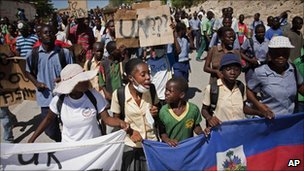
Many Haitians have long blamed peacekeepers for bringing cholera to the country
UN peacekeepers were the most likely source of the cholera epidemic sweeping Haiti, according to a leaked report by a French disease expert.
Epidemiologist Renaud Piarroux conducted research in Haiti on behalf of the French and Haitian governments.
Sources who saw the report said it had evidence the outbreak was caused by river contamination by Nepalese troops.
Read moreReport: UN Peacekeepers to Blame For Cholera Outbreak in Haiti
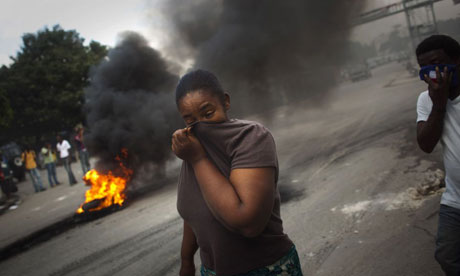
A woman covers her face from the smoke of burning tyres set up by demonstrators in Port-au-Prince, Haiti. Photograph: Emilio Morenatti/AP
UN peacekeepers in Haiti have shot dead at least one person in clashes sparked by claims that Nepalese soldiers brought the cholera epidemic that has swept the country, killing 1,000 people.
Crowds in two northern towns threw stones, set up burning barricades and blocked roads to protest against the presence of the foreign troops and the government’s response to the crisis, which has unsettled the authorities and the UN in the runup to elections on 28 November.
One man was shot by a UN peacekeeper during an exchange of gunfire in Quartier Morin, near the country’s second city, Cap-Haitien.
The UN peacekeeping force, known as Minustah, said the soldier had acted in self-defence, but an investigation had been launched.Cap-Haitien, the country’s second city, was this morning cut off from the rest of Haiti after a day of rioting shut its roads and airport, and left more than a dozen people wounded. Clashes in the town of Hinche injured seven Nepalese peacekeepers, according to local radio.
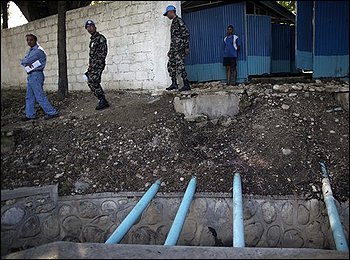
The head of Nepal’s mission in Haiti, Lt. Col. Krishna, center, and Prakash Neupane, deputy chief of the MINUSTAH engineering section, left, enter Nepal’s U.N. base in Mirebalais, Haiti, Sunday Oct. 31, 2010. A cholera outbreak that has killed more than 300 people in Haiti matches strains commonly found in South Asia, the U.S. Centers for Disease Control and Prevention said Monday, intensifying the scrutiny of a U.N. base that is home to recently arrived Nepalese peacekeepers, built on a tributary to the Artibonite River. (AP Photo/Ramon Espinosa)
PORT-AU-PRINCE, Haiti — Researchers should determine whether United Nations peacekeepers were the source of a deadly outbreak of cholera in Haiti, two public health experts, including a U.N. official, said Wednesday.
The U.S. Centers for Disease Control and Prevention found that the strain of cholera that has killed at least 442 people the past three weeks matches strains found in South Asia. The CDC, World Health Organization and United Nations say it’s not possible to pinpoint the source and investigating further would distract from efforts to fight the disease.
But leading experts on cholera and medicine consulted by The Associated Press challenged that position, saying it is both possible and necessary to track the source to prevent future deaths.
“That sounds like politics to me, not science,” Dr. Paul Farmer, a U.N. deputy special envoy to Haiti and a noted expert on poverty and medicine, said of the reluctance to delve further into what caused the outbreak. “Knowing where the point source is – or source, or sources – would seem to be a good enterprise in terms of public health.”
The suspicion that a Nepalese U.N. peacekeeping base on a tributary to the infected Artibonite River could have been a source of the infection fueled a protest last week during which hundreds of Haitians denounced the peacekeepers.
United Nations investigators have taken samples of foul-smelling waste trickling behind a Nepalese peacekeeping base in Haiti amid claims that sewage from the newly arrived unit caused the cholera epidemic that has made more than 4,000 people ill.
Journalists visiting the base unannounced came upon the investigators and mission spokesman Vincenzo Pugliese later confirmed that the military team was testing for cholera.
It was the first public acknowledgement that the 12,000-member force was directly investigating allegations that its base played a role in the outbreak.
Meanwhile, the epidemic continued to spread, with cases confirmed in two new departments in Haiti’s north and north east, said UN Office for the Co-ordination of Humanitarian Affairs spokeswoman Imogen Wall. At least 303 people have died and 4,722 have been taken to hospital.
– Haiti to to be affected by cholera ‘for years to come’ (Telegraph):
Cholera will remain a problem in Haiti for years to come, the World Health Organisation (WHO) has predicted.
An epidemic of the disease in the Caribbean country has killed 259 people, with 3,000 others admitted to hospital.
Some health officials and aid workers said on Tuesday that the outbreak appeared to be slowing and had not infiltrated the “tent towns” around Port-au-Prince, the capital.
Read moreWHO: Haiti to to be affected by cholera ‘for years to come’; Outbreak reaches capital city
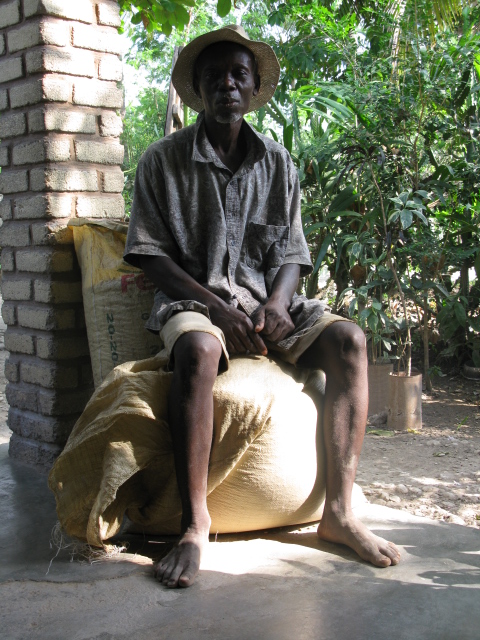
Jonas Deronzil from Verrettes has been farming since 1974. Like small producers throughout Haiti, his meager income from corn, rice, and beans is threatened by new competition from Monsanto.
“A new earthquake” is what peasant farmer leader Chavannes Jean-Baptiste of the Peasant Movement of Papay (MPP) called the news that Monsanto will be donating 60,000 seed sacks (475 tons) of hybrid corn seeds and vegetable seeds, some of them treated with highly toxic pesticides. The MPP has committed to burning Monsanto’s seeds, and has called for a march to protest the corporation’s presence in Haiti on June 4, for World Environment Day.
In an open letter sent of May 14, Chavannes Jean-Baptiste, the Executive Director of MPP and the spokesperson for the National Peasant Movement of the Congress of Papay (MPNKP), called the entry of Monsanto seeds into Haiti “a very strong attack on small agriculture, on farmers, on biodiversity, on Creole seeds…, and on what is left our environment in Haiti.”[1] Haitian social movements have been vocal in their opposition to agribusiness imports of seeds and food, which undermines local production with local seed stocks. They have expressed special concern about the import of genetically modified organisms (GMOs).
For now, without a law regulating the use of GMOs in Haiti, the Ministry of Agriculture rejected Monsanto’s offer of Roundup Ready GMO seeds. In an email exchange, a Monsanto representative assured the Ministry of Agriculture that the seeds being donated are not GMO.
Elizabeth Vancil, Monsanto’s Director of Development Initiatives, called the news that the Haitian Ministry of Agriculture approved the donation “a fabulous Easter gift” in an April email.[2] Monsanto is known for aggressively pushing seeds, especially GMO seeds, in both the global North and South, including through highly restrictive technology agreements with farmers who are not always made fully aware of what they are signing. According to interviews by this writer with representatives of Mexican small farmer organizations, they then find themselves forced to buy Monsanto seeds each year, under conditions they find onerous and at costs they sometimes cannot afford.
Read moreHaitian Farmers to Burn Donated Monsanto Hybrid Seeds
The US has sent 33,000 troops to Haiti, but they are nowhere to be found?
That is called ‘full American Katrina support’!:
Robert Gates: “I don’t know how … [the US] government could have responded faster or more comprehensively than it has.”
….US President Barack Obama pledged full American support in a phone call to his Haitian counterpart Rene Preval.
Source: BBC NEWS
Related articles:
– UNICEF: Children disappearing from Haiti hospitals
– Haitians Receive Little Help Despite Promises From World Leaders; US Doctors Are Desperate
EXTRA: An Interview With A Haitian-American Nurse
While I was getting something to eat in Delmas, I ran into a group of Haitian American nurses and doctors from the United States. I wanted to get their reaction to the earthquake and relief efforts.
“I thought I was going to be seeing military everywhere.”
Listen to the interview, click here for the MP3 (4 mins 9 secs)
You have to be in Haiti to see for yourself that no where in Port-au-Prince are troops present or actively helping survivors.
No Aid In Port-au-Prince
I have been driving all week around Port-au-Prince taking photos of the destroyed homes and buildings and as I’ve gone from one end of this city to the other, the US is military is only found at the airport – nice and secured behind those gates.
Meanwhile, the UN and its white Jeeps are driving all around this city, but I haven’t seen them stop at any particular location to give food or water. Where is all the aid going, if any?
Michel David Stephan is a 22-year-old Haitian university student who has not been able to continue his studies because the campus has been badly damaged. I asked him what he thought of the UN.
“We call them ‘tourists’ because they don’t do nothing,” Stephan told me.
I also asked Stephan what he thought of the US military.
“They are tourists too, they only come to take pictures,” he said.
The only people present and actively helping on the ground are members of relief organizations, but there aren’t enough of them.
As a journalist my job is to try to provide answers, but I find myself scratching my head too. The troops are not seen at the tent cities or shanty towns – are they tanning at the beach? That’s a big maybe.
In many parts of Port-au-Prince you see people selling and providing services. They are trying to go back to a normal life, but right next to a bank, there is a tent city and when you drive around at night, you see people camping out where ever there is space. Do they have a full belly? Most likely not. Would they appreciate the help? No doubt.
There is a big propaganda machine spitting out lies that the Haitians are happy to see Americans everywhere, but those Haitians must be the ones living in the United States. Here what you see are signs with phrases like: “We need food and water,” “We need medicine.”
Read moreHaiti: US Military Nowhere To Be Found In Port-au-Prince
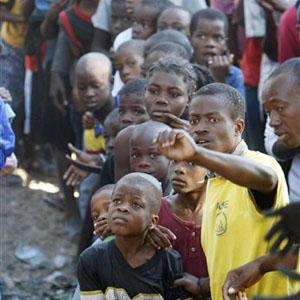
Haitian children line up to receive food at a food distribution site run by the U.S. Army 82nd Airborne Division a week after the massive earthquake in Port-au-Prince, Haiti, 21 Jan 2010
UNICEF warned of children disappearing from hospitals and raised fears of child trafficking in the wake of Haiti’s devastating Jan. 12 earthquake. Thirty-three Haitian orphans arrived in Paris on Friday after France fast-tracked adoption procedures.
The UN Children’s Fund (UNICEF) announced Friday that several children have gone missing from hospitals in Haiti in the aftermath of the killer earthquake, raising fears of trafficking for adoption abroad.
“We have documented let’s say around 15 cases of children disappearing from hospitals, and not with their own family at the time,” UNICEF adviser Jean Luc Legrand said.
The UN agency said it expected trafficking networks to spring into action, taking advantage of weakened local authorities to kidnap children and eventually getting them out of the country.
33,000 US troops! Can we call it a invasion now?
– Haitians Receive Little Help Despite Promises From World Leaders; US Doctors Are Desperate
– Ex-minister warns of US ‘takeover’ of Haiti
I am not saying that Hugo Chavez is right, but I know that the US and the Russians have weapons that could easily cause such an earthquake.
Added: 20. Januar 2010
Venezuelan leader Hugo Chavez has once again accused the United States of playing God. But this time it’s Haiti’s disastrous earthquake that he thinks the U.S. was behind. Spanish newspaper ABC quotes Chavez as saying that the U.S. navy launched a weapon capable of inducing a powerful earthquake off the shore of Haiti. He adds that this time it was only a drill and the final target is … destroying and taking over Iran.
I also know that the elite plans to invade Iran within the next 3 years to cause WW III. The elite constantly changes their plans and adapts them to the ‘environment’ very quickly. Call me a conspiracy nutcase, I don’t care. I know it. So maybe Chavez is right.
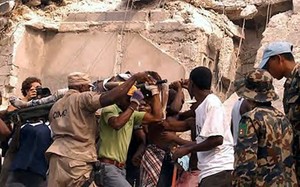
A major part of the Haitian disaster operation is providing security for victims and rescuers.
About 20,000 U.S. troops are expected to support relief efforts in Haiti by next week in addition to the 13,000 American military personnel already there, according to Pentagon spokesman John Kruzel.
Those men and women to be deployed are members of the 22nd Marine Expeditionary Unit, the 82nd Airborne Division’s 2nd Brigade and other units. Thousands of other troops are operating afloat off the Haitian coast and on shore, distributing provisions, assisting in medical operations and helping to maintain security. Some 2,200 Marines of the 24th Marine Expeditionary Unit are slated to arrive within 48 hours, Kruzel reports.
“The 24th Marine Expeditionary Unit is a huge part of enabling us to extend our reach to places around the country that may need our assistance but we just haven’t been there yet,” Army Lieutenant General P.K. Keen, the top U.S. commander in Haiti, said on Thursday during a segment aired on The Pentagon Channel.
The additional forces come as international aid continues pouring into Haiti following a magnitude 7 earthquake that struck Jan. 12, creating what an official called one of the greatest humanitarian emergencies in the history of the Americas, reports Kruzel, in a statement obtained by the National Association of Chiefs of Police.
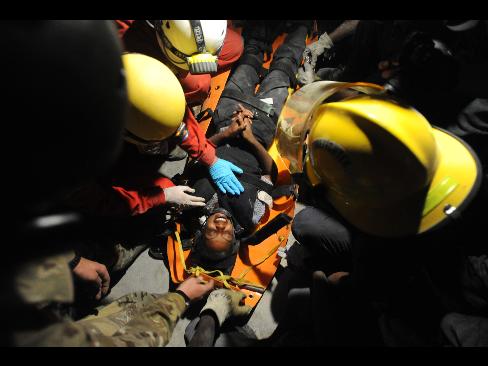
French rescuers work on a victim in a collapsed building, one week after the earthquake in Port-au-Prince, on Jan. 19, 2010. Photographer: Juan Barreto/AFP/Getty Images
Jan. 20 (Bloomberg) — An earthquake measuring 6.1 struck Haiti today, eight days after the devastating temblor that may have killed more than 200,000 people, the U.S. Geological Survey said.
The quake was centered 59 kilometers (36 miles) to the west-southwest of the capital Port-au-Prince at a depth of 9 kilometers, the USGS said in a preliminary e-mailed report. It struck at 6:03 a.m. local time, the USGS said.
Rescue workers with the New York police and fire departments reported “violent shaking” from the tremor yet were able to continue working, according to an e-mailed statement from the police department. The 76-member team, which includes four police dogs, pulled two children alive from the rubble of a brick building last night.
Buildings shook in Port-au-Prince and people fled to the streets, the Associated Press reported. The Pacific Tsunami Warning Center said the earthquake was located too far inland to generate any tidal waves in the Caribbean, AP said.
“We felt the quake but it wasn’t too bad,” said Tamar Hahn, an aid worker with the United Nations Children’s Fund, in an interview on Argentina’s C5N television. “They say it was a 6.1 but it didn’t feel so strong.”
Read moreHaiti Hit by Strong 6.1 Magnitude Quake, Shaking Buildings
Read and weep:
– US doctors beg their government to admit critically injured children from Haiti (Times):
“We can’t evacuate any Haitian patients to the US,” John McDonald, from the University of Miami Medical School, said. “Our country treats the Haitians like s***. The people land, they get sent back. When Cubans land, they open restaurants.”
Another doctor at the tented clinic said that she was so desperate at being forced to discharge children still in grave danger of dying from infection that she wanted to “scream and scratch people”. For want of bed space “we are sending wounded children back on to the streets of Port-au-Prince with no plan even for how they will be fed,” said Jennifer Furn, from Harvard Medical School.
Dr Furn’s task was complicated by instructions from the UN to vacate the tents by 8am yesterday. “The UN say they need these tents as a staging post for regular personnel,” Dr Furn said. “It’s breaking my heart. How can I send children with wounds and head bandages out into the streets?”
– French minister criticizes US aid role in Haiti: ‘This is about helping Haiti, not about occupying Haiti.’ (AP)
So this is ‘full American support’???
Robert Gates: “I don’t know how … [the US] government could have responded faster or more comprehensively than it has.”
….US President Barack Obama pledged full American support in a phone call to his Haitian counterpart Rene Preval. Source: BBC NEWS
Full ‘Katrina’ support!
I could have uploaded HORRIBLE pictures piled up with corpses, but choose not to, because I want you to be able to get some sleep.

As the UN defers decision-making to an almost non-existent Haitian Government, looting is rife. One woman was reported to have been decapitated
PORT-AU-PRINCE (Reuters) – U.S. troops will help keep order on Haiti’s increasingly lawless streets, the country’s president said on Sunday as desperate earthquake survivors waited for food, water and medicine.
World leaders pledged massive aid programmes to rebuild Haiti but desperate earthquake survivors were still waiting on Sunday for food, water and medicine.
Five days after a 7.0 magnitude quake killed up to 200 000 people, international rescue teams clawed away at the rubble of collapsed buildings in the wrecked capital, Port-au-Prince, in a race against time to find more survivors.
But logistical logjams kept major relief from reaching the hundreds of thousands of hungry Haitians waiting for help, many of them sheltering in makeshift camps on streets strewn with debris and decomposing bodies.
Read moreHaitians Receive Little Help Despite Promises From World Leaders; US Doctors Are Desperate
Related articles:
– CLash over Haiti aid flights (Financial Times):
Fuel shortages, poor communications and a logjam at the Port au Prince airport on Sunday continued to hinder a massive international aid effort to Haiti five days after a devastating earthquake in which more than 100,000 are now feared to have died.
The United Nations humanitarian agency, Ocha, warned at the weekend that humanitarian operations might be forced to shut down in the next few days if fuel supplies were not replenished.
As Ban Ki-moon, UN Secretary-General, headed for Haiti to see for himself the extent of the worst humanitarian disaster that the world body has had to cope with in decades, concern grew over delays in the airlift to the capital’s airport, which is under US control.
Alain Joyandet, French co-operation minister, told reporters at the airport he had protested to Washington via the US ambassador about the US military’s management of the airport where he said a French medical aid flight had been turned away.
In Paris, the foreign ministry tried to quash a looming diplomatic spat by insisting Franco-American co-operation was proceeding as well as possible in view of the extent of the disaster.
Mr Joyandet’s complaint underlined the frustration of relief teams dependent on the single runway at the airport to ferry in supplies if they were to avoid 24-hour delays involved in bringing supplies in by road from the neighbouring Dominican Republic.
The French news agency AFP also quoted people trying to leave Haiti as complaining that the US was giving priority to its own citizens. The US military re-established operations at the airport after its control tower was damaged in the earthquake. Kenneth Merten, US ambassador, told AFP: “We’re working in co-ordination with the United Nations and the Haitians. “Clearly it’s necessary to prioritise the planes. It’s clear that there’s a problem.”
– Haiti: After a day of deliveries, US ship runs out of aid (AFP)
The solution:
Jan. 18 (Bloomberg) — More U.S. troops are arriving in Haiti today after the American commander on the ground said that security must be improved to ensure aid reaches survivors of last week’s earthquake. Source: Bloomberg

US soldiers at Port-au-Prince international airport.
PARIS (AP) — The United Nations must investigate and clarify the dominant U.S. role in earthquake-ravaged Haiti, a French minister said Monday, claiming that international aid efforts were about helping Haiti, not “occupying” it.
U.S. forces last week turned back a French aid plane carrying a field hospital from the damaged, congested airport in the Haitian capital of Port-au-Prince, prompting a complaint from French Cooperation Minister Alain Joyandet. The plane landed safely the following day.
French Foreign Minister Bernard Kouchner warned governments and aid groups not to squabble as they try to get their aid into Haiti.
“People always want it to be their plane … that lands,” Kouchner said Monday. “(But) what’s important is the fate of the Haitians.”
But Joyandet persisted.
“This is about helping Haiti, not about occupying Haiti,” Joyandet, in Brussels for an EU meeting on Haiti, said on French radio.
In another weekend incident, some 250 Americans were flown to New Jersey’s McGuire Air Force Base on three military planes from Haiti. U.S. forces initially blocked French and Canadians nationals from boarding the planes, but the cordon was lifted after protests from French and Canadian officials.